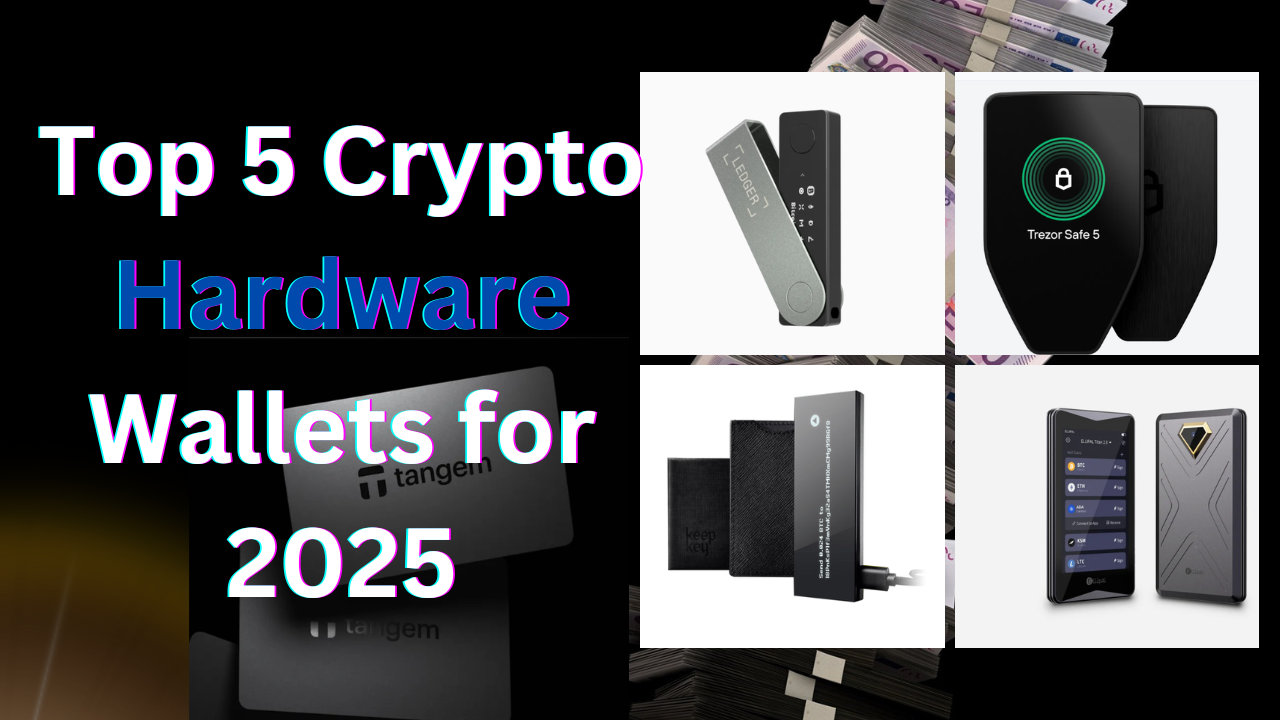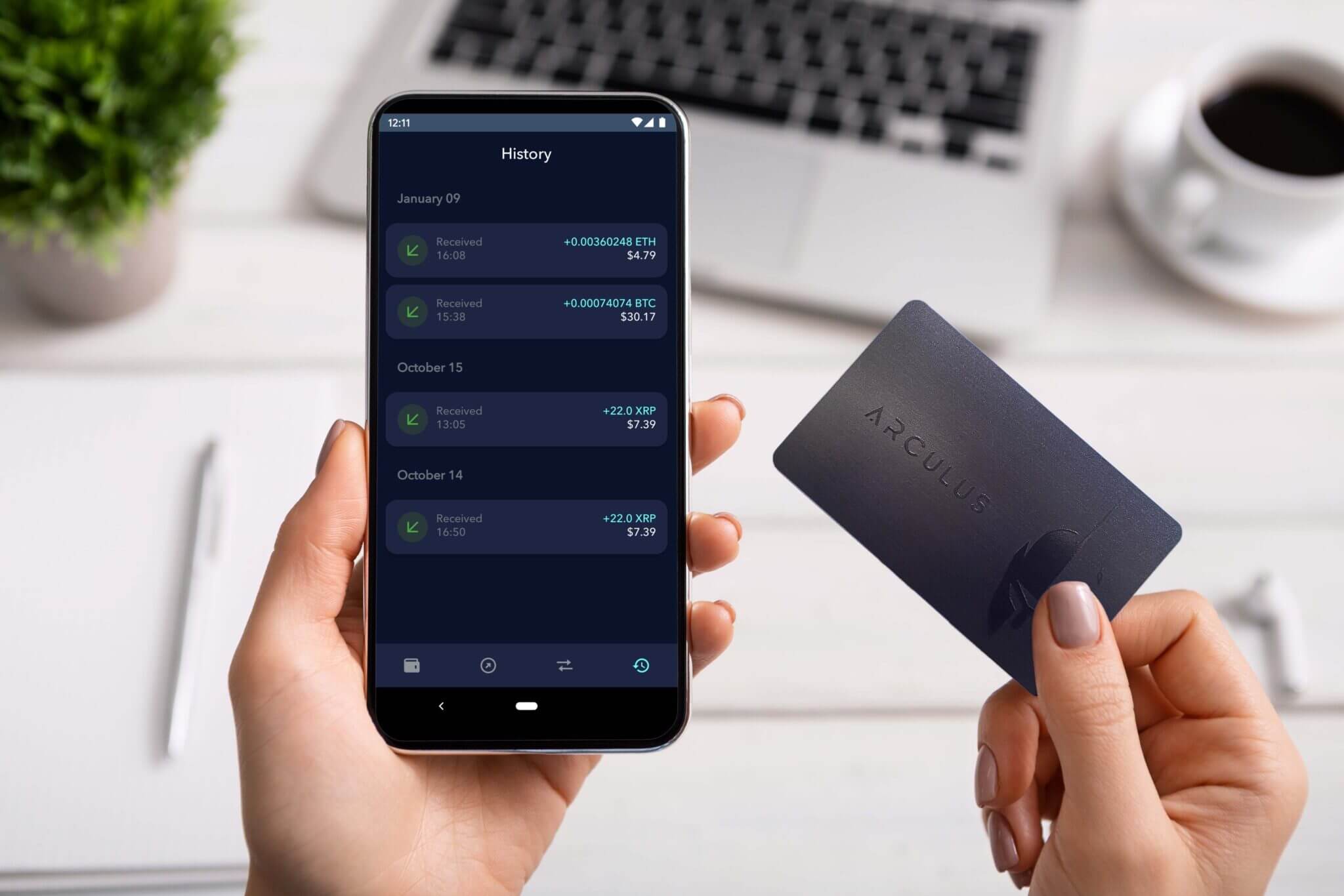In the world of cryptocurrency, security is paramount. With the rise of hacks, scams, and phishing attacks, keeping your digital assets safe has never been more important. Hardware wallets, also known as cold wallets, are one of the safest ways to store your crypto offline. In this article, we’ll explore the top 5 crypto hardware wallets for 2025, focusing on their security, ease of use, and price. Whether you’re a crypto newbie or a seasoned investor, this guide will help you choose the best hardware wallet for your needs.
Why Use a Hardware Wallet?
Before diving into the list, let’s quickly recap why hardware wallets are essential:
- Security: Hardware wallets store your private keys offline, making them immune to online hacks.
- Control: You have full custody of your funds—no third parties involved.
- Compatibility: Most hardware wallets support a wide range of cryptocurrencies.
- Peace of Mind: With a hardware wallet, you can sleep soundly knowing your crypto is safe.
Now, let’s dive into the top 5 hardware wallets for 2025.
1. Ledger Nano X: The Industry Leader

Overview:
The Ledger Nano X is one of the most popular and trusted hardware wallets in the crypto space. Known for its robust security and user-friendly interface, it’s a favorite among both beginners and advanced users.
Key Features:
- Bluetooth Connectivity: Use it with your smartphone without needing to plug it in.
- Multi-Currency Support: Store over 5,500 cryptocurrencies, including Bitcoin, Ethereum, and altcoins.
- Compact Design: Small and inconspicuous, making it easy to carry and hide.
- Staking: Stake certain cryptocurrencies directly through the Ledger Live app.
Pros:
- Trusted brand with a long track record.
- Bluetooth connectivity for mobile use.
- Affordable at around $180.
Cons:
- Slightly more expensive than some competitors.
- Limited support for non-EVM chains.
Best For: Anyone looking for a reliable, secure, and easy-to-use hardware wallet.
2. Trezor Safe 5: The Trusted Alternative

Overview:
Trezor is another heavyweight in the hardware wallet industry, known for its durability and security. The Trezor Safe 5 is their latest model, offering advanced features for crypto enthusiasts.
Key Features:
- No Bluetooth: Some users prefer this for added security.
- Wide Coin Support: Supports more cryptocurrencies than Ledger.
- Durable Build: Sleek and sturdy design.
- Open Source: Fully transparent software for added trust.
Pros:
- Proven track record with no major breaches.
- Supports a wide range of cryptocurrencies.
- User-friendly interface.
Cons:
- No Bluetooth connectivity.
- Slightly more expensive than Ledger Nano X.
Best For: Users who prioritize security and prefer a non-Bluetooth option.
3. KeepKey: The Budget-Friendly Option

Overview:
KeepKey is a newer player in the hardware wallet market but has quickly gained popularity due to its affordability and wide coin support.
Key Features:
- Affordable Price: Priced at just 45–45–50, it’s one of the cheapest hardware wallets.
- Wide Coin Support: Supports a vast array of cryptocurrencies, including lesser-known altcoins.
- Simple Interface: Easy to use, even for beginners.
- Large Display: Clear and easy-to-read screen.

Pros:
- Extremely affordable.
- Supports a wide range of cryptocurrencies.
- Simple and user-friendly.
Cons:
- Limited brand recognition compared to Ledger and Trezor.
- No Bluetooth connectivity.
Best For: Beginners or those with smaller portfolios looking for an affordable option.

4. Ellipal Titan 2 : The High-End Choice

Overview:
The Ellipal Titan 2 is a premium hardware wallet that combines security with a sleek, phone-like design. It’s perfect for users who want a high-end device with advanced features.
Key Features:

- QR Code Scanning: No cables or Bluetooth—just scan QR codes for transactions.
- Air-Gapped Security: Completely offline, ensuring maximum security.
- Large Touchscreen: Easy-to-use interface with a modern design.
- Durable Build: Waterproof, dustproof, and tamper-proof.
Pros:
- High-end design and build quality.
- Air-gapped security for added protection.
- Supports a wide range of cryptocurrencies.
Cons:
- Expensive at around $200.
- Bulkier than other options.

Best For: Advanced users who want a premium, high-security hardware wallet.
5. Tangem Wallet : The Unique and Discreet Option

Overview:
Tangem offers a unique approach to hardware wallets with its card-based and ring-based solutions. These wallets are perfect for users who value discretion and portability.
Key Features:
- Card and Ring Options: Choose between a wallet card or a wearable ring.
- NFC Technology: Tap your phone to access your crypto.
- Inconspicuous Design: No one will suspect it’s a crypto wallet.
- Affordable: The card version costs just 55∗∗,whiletheringis∗∗55∗∗,whiletheringis∗∗160.

Pros:
- Extremely discreet and portable.
- Affordable card option.
- Easy to use with NFC technology.
Cons:
- Limited brand recognition.
- The ring option is more expensive.

Best For: Users who want a unique, portable, and discreet hardware wallet.
Final Thoughts
Choosing the right hardware wallet depends on your budget, security needs, and the types of cryptocurrencies you hold. Here’s a quick summary:
- Ledger Nano X: Best overall for security, ease of use, and Bluetooth connectivity.
- Trezor Safe 5: A trusted alternative with wide coin support and no Bluetooth.
- KeepKey: The most affordable option for beginners or those with smaller portfolios.
- Ellipal Titan 2: A premium, high-security option with a sleek design.
- Tangem Wallet: A unique and discreet choice for portability and convenience.
No matter which wallet you choose, always prioritize security. Back up your seed phrase, keep your wallet in a safe place, and never share your private keys. With the right hardware wallet, you can confidently secure your crypto and protect your digital wealth.
FAQs: Top 5 Crypto Hardware Wallets for 2025
1. What is a hardware wallet?
A hardware wallet is a physical device that stores your cryptocurrency offline, keeping your private keys secure from online threats like hacking and phishing. It’s one of the safest ways to store crypto.
2. Why should I use a hardware wallet instead of a software wallet?
Hardware wallets provide cold storage, meaning your private keys are stored offline and are immune to online attacks. Software wallets (hot wallets) are connected to the internet, making them more vulnerable to hacking.
3. Which hardware wallet is the most secure?
All the wallets listed (Ledger Nano X, Trezor Safe 5, KeepKey, Ellipal Titan 2, and Tangem Wallet) are highly secure. However, Ledger Nano X and Trezor Safe 5 are the most trusted due to their long track records and advanced security features.
4. Can I store multiple cryptocurrencies on a hardware wallet?
Yes, most hardware wallets support multiple cryptocurrencies. For example:
- Ledger Nano X: Supports 5,500+ coins.
- Trezor Safe 5: Supports a wide range of coins.
- KeepKey: Supports a vast array of altcoins.
- Ellipal Titan 2: Supports 10,000+ tokens.
- Tangem Wallet: Supports major cryptocurrencies like Bitcoin, Ethereum, and more.
5. Are hardware wallets expensive?
Hardware wallets range in price:
- KeepKey: 45–45–50 (most affordable).
- Ledger Nano X: $180.
- Trezor Safe 5: Around $200.
- Ellipal Titan 2: $200.
- Tangem Wallet: 55(card)or55(card)or160 (ring).
6. Can I use a hardware wallet with my smartphone?
Yes, some hardware wallets like Ledger Nano X (Bluetooth) and Tangem Wallet (NFC) are designed to work seamlessly with smartphones. Others, like Trezor Safe 5 and KeepKey, require a USB connection.
7. What happens if I lose my hardware wallet?
If you lose your hardware wallet, you can recover your funds using your seed phrase (a 12–24 word backup). Always store your seed phrase securely and offline.
8. Can I stake crypto using a hardware wallet?
Yes, some hardware wallets like Ledger Nano X allow you to stake certain cryptocurrencies directly through their apps (e.g., Ledger Live).
9. Which hardware wallet is best for beginners?
For beginners, Ledger Nano X and KeepKey are great options due to their user-friendly interfaces and affordable prices.
10. Which hardware wallet is the most portable?
The Tangem Wallet (card or ring) is the most portable and discreet option. It’s perfect for users who want to carry their wallet easily.
11. Can I use a hardware wallet with decentralized apps (dApps)?
Yes, hardware wallets like Ledger Nano X and Trezor Safe 5 can connect to dApps through compatible software like MetaMask.
12. Are hardware wallets waterproof or tamper-proof?
Some hardware wallets, like the Ellipal Titan 2, are waterproof, dustproof, and tamper-proof. Always check the specifications of the wallet you’re interested in.
13. Can I buy a hardware wallet directly from the manufacturer?
Yes, it’s recommended to buy hardware wallets directly from the manufacturer’s website to avoid tampered or counterfeit devices.
14. What is the difference between Ledger Nano X and Trezor Safe 5?
- Ledger Nano X: Bluetooth connectivity, supports 5,500+ coins, and is more compact.
- Trezor Safe 5: No Bluetooth, wider coin support, and a durable design.
15. Is the Tangem Wallet secure?
Yes, the Tangem Wallet uses NFC technology and is designed to be secure and discreet. However, it’s newer compared to Ledger and Trezor, so it has less brand recognition.
16. Can I use a hardware wallet with multiple devices?
Yes, most hardware wallets can be used with multiple devices (PC, Mac, smartphone) as long as you have the necessary software or app installed.
17. What is a seed phrase, and why is it important?
A seed phrase is a 12–24 word backup that allows you to recover your wallet if it’s lost or damaged. It’s crucial to store it securely and never share it with anyone.
18. Can I use a hardware wallet for NFTs?
Yes, hardware wallets like Ledger Nano X and Trezor Safe 5 support NFTs. You can manage and store your NFTs securely using these devices.
19. Which hardware wallet has the best customer support?
Ledger and Trezor are known for their excellent customer support. Exodus (software wallet) also offers 24/7 support, but it’s not a hardware wallet.
20. Can I use a hardware wallet without an internet connection?
Yes, hardware wallets operate offline, making them immune to online threats. You only need an internet connection when sending or receiving crypto.






